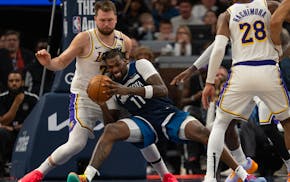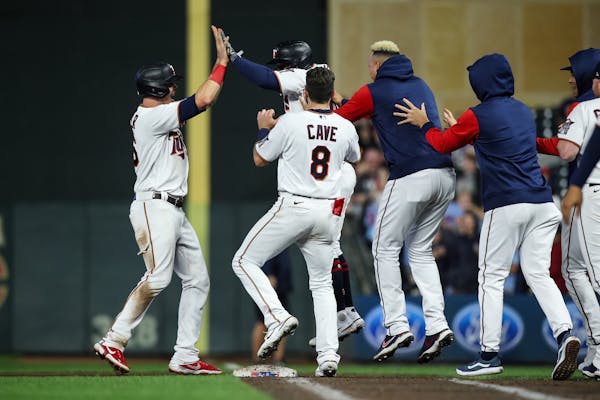The beginning and potential end of Carlos Correa's tenure with the Twins were the ultimate in contrasts.
News broke of the star free agent's signing around 1 a.m. on a Saturday morning in mid-March, meaning many Twins fans woke up to the shocking revelation that their usually fiscally conservative team had just made the World Series-winning shortstop the highest-paid infielder in history at $35.1 million a season. Ticket sales jumped. Excitement built.
The catch, of course, was Correa held the opt-outs after 2022 and '23, meaning the three-year deal could realistically end after just one, allowing him to test free agency again. Back then, that felt like something that could be dealt with once the two-time All-Star led the organization back to playoffs redemption after an embarrassing 2021.
Yet months later, Correa's presumptive last game as a Twin barely registered. He watched Wednesday's 10-1 victory over the White Sox from the bench in Chicago, no need to play and risk injury with the Twins 14 games out of the American League Central race and finishing in third place with a 78-84 record. And that "Correa boost for tickets" helped only so much, as the Twins finished the home slate with the lowest attendance in Target Field history, barring the pandemic seasons of 2020 and '21.
Correa, however, did exactly what his hefty salary expected. He immediately assumed a leadership position alongside Byron Buxton. He mentored rookies such as Jose Miranda and pushed third-year player Luis Arraez to assume more of a vocal role. He shared his deep knowledge of statistics and analytics with his teammates. He displayed Gold Glove defense on nearly every play. And he played his best baseball in September to end the year with a .291 average, 64 RBI and 22 home runs.
The rest of the team, though, was on the opposite trajectory. The Twins led the division for much of the first half of the season, but struggled to put everything together at the same time. When the hitting was on, the bullpen blew late games. When the bullpen tightened up in the last months, the hitting became inconsistent. Baserunning never really improved. And injuries plagued almost every position throughout the campaign.
"It's not where we wanted to be at the end of the year," Correa said. "The first three months were very promising, and then everything went downhill."
The Twins finished without injured players Buxton, second baseman Jorge Polanco, right fielder Max Kepler and starter Sonny Gray, among many others. That seemed to be the basis of a final unraveling, one in which the Twins plummeted from a tie for first place to elimination in the span of 20 days in September.
President of Baseball Operations Derek Falvey and manager Rocco Baldelli will both have jobs come 2023 but have vowed to thoroughly examine all of 2022's failures, which could mean changes coming to the coaching, medical and training staff.
And the lineup will change. To be fair, no one anticipated Correa would be around for more than this one year. He needed a non-locked out offseason to secure a lengthy contract, and the Twins needed a shortstop as prospect Royce Lewis played his first competitive season of baseball after two years off because of the pandemic and an ACL tear.
Lewis since had another knee surgery, meaning the Twins still would probably enjoy Correa's services next season. But that was always supposed to be the extra credit, not the main assignment.
The task at hand was to win in the one guaranteed season the Twins had one of the top players in the game on their roster. And they flunked.
"When you're able to add someone like that, and you don't know if they're going to be back after one year, you want to take advantage of that. That's a huge opportunity," Baldelli said. "… He goes out there and holds up his end in a really big way. … We missed our opportunities on our end to put our team in the right spot."
Baldelli and Correa shared a breakfast on that final road trip in Chicago, which sounded a lot like a goodbye. Correa called Baldelli a trustworthy friend, even telling the manager he loved him after he exited what was likely his final Twins game.
Correa didn't brush off remaining with the Twins, but he made it clear it would have to be on a long-term contract, not just his current option. He said his family — including his pregnant wife, Daniella, and their almost 1-year-old son Kylo — love the Twin Cities and the family environment around the team. The organization has treated them well. And maybe most importantly, being on the Twins gave Correa a chance to control his own story.
Being with the Astros since they drafted him No. 1 in 2012 meant the 28-year-old would find it hard to become a valued leader with so many other veterans in place. The 2017 sign-stealing scandal still encourages boos every time Correa bats on the road, but he felt this was the first season he could really show who he is as a person without answering to that first.
So the one-season trial wasn't a loss for Correa. Just for the Twins. Unless nostalgia will suffice.
"I'm sure there's going to be a lot of people missing him if he doesn't come back," third baseman Gio Urshela said. "But a lot of people are going to take good memories of him playing for the Twins team."
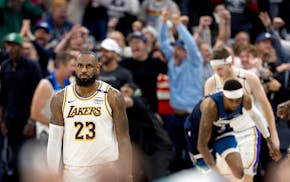
Scoggins: Redick's no-sub second half looked desperate, appears damaging
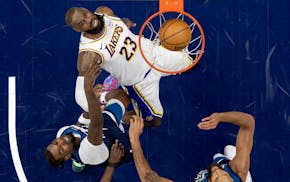
Edwards scores 43 as Wolves gain control of series with Lakers
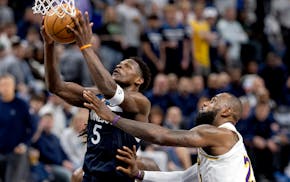
Souhan: Timberwolves star works in a shove while pushing Lakers to a precipice
Coach and athletic director who put Hamline on the rise dies at 100
